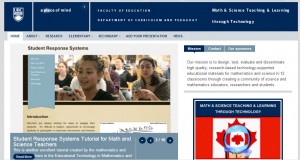Reflections on Teaching an Online Course about Educational Technologies in STEM
This summer I have been very busy. I have been teaching two graduate courses. Both focused on the implementation of educational technologies in Science, Technology, Engineering and Mathematics fields. One of these courses was an intensive three week course where we met daily with students for 2.5 hours on campus. This was a great course (at least in my view) as we had a community of STEM teachers and people interested in STEM education. Being able to meet daily met that we were able to create a community of practice and got to know each other pretty well. It also had its challenges as it was very intensive. The second course I have been teaching for 13 weeks (one more week left) was an online course exploring the same topic. Both course I designed, but online and Face-to-Face (F2F) courses are very different by nature, so I couldn’t do the same thing for both. I expected to have a somehow higher quality experience with the F2F course.
Yet I was very surprised to find both experiences very rewarding (equally but in different ways). The F2F experience was great, but the online experience was as rewarding. First of all, the longer time frame was great as we had time to think about things. However, what was the most surprising, was the community that was created in the online course. I think some students (all of them are part of the Master of Educational Technology Program at UBC) just strive in an online environment. Interestingly, with the modern technology, such as Google Hangouts, Skype, Blackboard Connect, I felt that we kept close and very open communication during the entire three month. I also felt that we got to know each other very well and we got to share ideas and experiences better than people do in the F2F classroom. It is hard for me to judge it (as I do not know what the students in these courses felt – I haven’t seen the evaluations yet), but I think both media can be very rewarding. And if you want to see the quality of the work produced by the students in the MET program (the online cohort), check our Mathematics and Science Teaching and Learning through Technology website: http://scienceres-edcp-educ.sites.olt.ubc.ca/ These teachers produced Educational Technology Tutorials – resources that can be used in schools to conduct professional development in the context of technology enhanced mathematics and science education. I realize I am not very objective here, but I think it is outstanding and I do see how this graduate course can make a difference in how they will teach students or will conduct professional development at their schools.

September 15th, 2013 at 7:06 pm
A Call for Chapters
Potential Book Title – The Online Post-Secondary Educator: Stories from Within
Rationale – If you search you find many sites that tell you how to do x, y, z, and some research that reports qualitatively what the online educator does via methods and design. For instance,
http://www.crlt.umich.edu/tstrategies/tsot
http://elearnmag.acm.org/featured.cfm?aid=1609990
Books
1. Engaging the Online Learner: Activities and Resources for Creative Instruction (Jossey-Bass Guides to Online Teaching and Learning)
2. Building Online Learning Communities: Effective Strategies for the Virtual Classroom (Jossey Bass Higher and Adult Education Series)
3. The Online Teaching Survival Guide: Simple and Practical Pedagogical Tips
4. Essential Elements: Prepare, Design, and Teach Your Online Course
5. Making the Move to eLearning: Putting Your Course Online
6. Creating a Sense of Presence in Online Teaching: How to
They most often tell us how to do it yet few capture the experience of those who do teach online.
We propose a book where each author addresses the past (path to your current role), the present (what you do), how it’s done (issues, good, bad, the ugly), and lastly your vision for the future.
Of course you can colour outside these lines to infuse context, events, and the like.
Our intention is to present the reality of our work roles as online educators within PSE.
As experienced online instructors and often designers and course authors we have new insights and details of our own practice that is both instructive and unique. The unique post-secondary perspective, with its eLearning diversity, provides a rich framework and adds genuine complexity to the book.